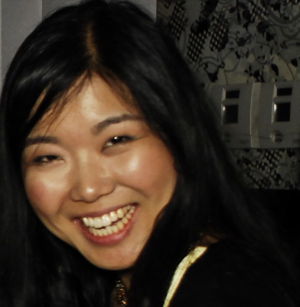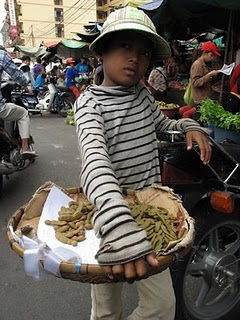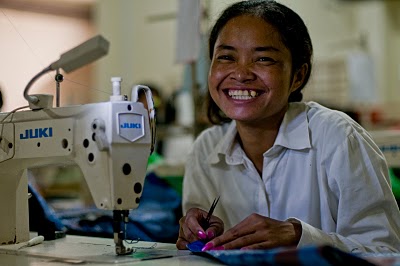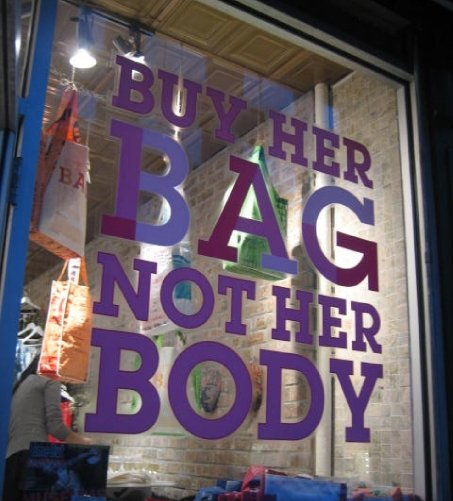By Stephen M. Bauer
It was a chance encounter in Cambodia that led Diana Mao to start Nomi Network. But her entire life — her upbringing, Christian faith, education, and life experiences — had prepared her to lead such a venture. Diana graduated from the University of California at Santa Barbara in 2004, where she received a BA in economics/accounting and Chinese. In Santa Barbara she was an activist and a leader in the city-wide movement to raise awareness and resources to stop the use of child soldiers in Northern Uganda.

In 2006, Diana enrolled in New York University’s Wagner School of Public Administration to study international development. In the summer between her first and second years at NYU, she joined a large microfinance institution and traveled to Cambodia for ten weeks to research the effectiveness of microfinance. She discovered that many former microloan clients, some of whom had received several loans, were still living in abject poverty. Diana’s task was to interview 300 former clients, which required traveling to five different provinces, including villages in very remote areas.

At NYU, Diana had heard about the issue of sex-trafficking but knew little about it. In Cambodia, prior to travelling to one particular village, she was informed that sex traffickers were active in the area. Agents from brothels were procuring children, either directly or by deception, to work as sex slaves in the cities. In that particular village, she visited a microfinance client who happened to have seven children. He showed Diana his youngest daughter and said to her and her colleague in broken English, something like, “You’re from America? You like her? Take my daughter.” Diana stared into his eyes and understood that he actually cared greatly for his daughter. He did not want to give her up, but he knew that his daughter would have a chance for a much better life in the United States. To Diana, the connection between poverty and sex trafficking suddenly became crystal clear.
Later in Phnom Penh, the capital of Cambodia, Diana’s experiential understanding of the issue was verified when yet another parent asked if she could take their child. While there, she was very disturbed seeing older men, many of them foreign, gallivanting with underage girls.
Diana returned to New York in a state of alarm, anxious to tell her friends, classmates, and fellow church members that something had to be done. She wanted to do something but didn’t know what. To gain support, she organized a prayer for the nations meeting in her apartment. Five friends came to the first meeting, each with a strong conscience and a passion to eradicate sex-trafficking. They met weekly to pray for the victims of human trafficking and for those living in poverty worldwide, to discuss the issue and what they might do.

By the time Diana received her Master’s in Public Administration (MPA), she had already started a plan to form a non-profit organization to fight sexual slavery. The members of her apartment prayer group became the kernel of what was later to be named Nomi Network. Diana recognized that one member, Alissa Moore, had personal skills and leadership strengths in areas that complemented her own weaknesses, and so she asked Alissa to become a co-founder.
In July of 2008, Diana and Alissa went to Cambodia to do an analysis of needs and determine what they might do to make an effective contribution to the cause. They interviewed people from a dozen different anti-trafficking organizations who were working with survivors of the sex trade. Diana and Alissa learned that one significant gap that needed to be filled was to provide training for jobs that paid a living wage and which were in demand. One of the major setbacks in helping survivors has been that after therapy, rehabilitation, and reintegration back into society, survivors often ended up back in the sex trade due to a lack of job skills that would enable them to earn a living wage in the legitimate economy. Several organizations were training survivors to make things which they could sell, but they all said that the problem was a lack of demand for the goods. Real demand, it is understood, can only come from the west, that is, the United States or Europe.
Due to the low wage rates in Cambodia, textile manufacturing has become a major industry. Many recognizable global brands have operations there. Seventy percent of Cambodia’s exports are textiles. We affluent westerners tend to look down on factory jobs, but to an ordinary Cambodian making the average national wage of between one or two dollars a day, a job in a garment factory is seen as a dream job. Still, this “dream job” is vastly underpaid by western standards.

Diana and Alissa made it a strategic goal for Nomi Network to establish a textile manufacturing function in Cambodia that would train and employ survivors, and compensate them at above market rates. To date, through working with a partner organization, STOPStart Enterprises (formerly Hagar On-Time), Nomi Network has been able to train and employ twenty-three women in Phnom Penh in the manufacture of women’s tote bags and market it under the name Buy Her Bag Not Her Body. Nomi Network has been working very hard to market the bags in the United States and to create demand.
The women are employed under ethical and dignified working conditions. They receive a wage that is above market rates but also receive health insurance for the entire family, plus child care, and one meal a day. On average, each worker is supporting a family of four or five. Entire families are being lifted out of poverty. With the upcoming Nomi Network spring collection of bags, the number of survivors employed will soon rise to forty. Hopefully, this is only the beginning. Nomi Network hopes to continue to expand and to help employ more survivors. Moreover, Nomi Network hopes to be able to eventually provide additional education and a career path for workers who show potential.
If Diana’s personality had to be summed up in one word, it would have to be “committed.” She says, “I know that I can’t save the world, but I can at least do what I am able to. What propels me is my faith, and the knowledge that the race is not to the swift, or to the strong, but to those who endure.”
This piece was originally posted at the Nomi Network blog.
See the InterVarsity Alumni story on Diana Mao’s Nomi cofounder, Alissa Moore.